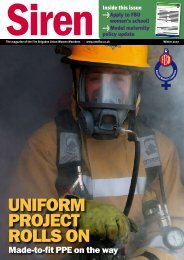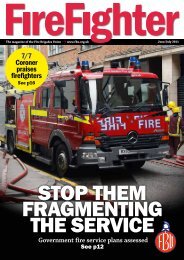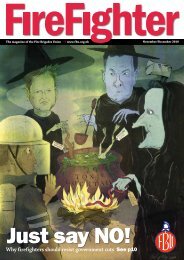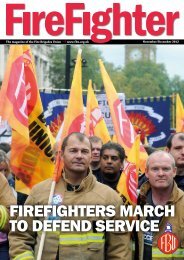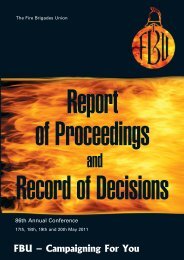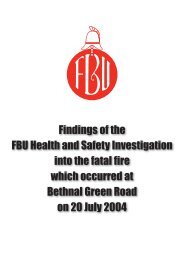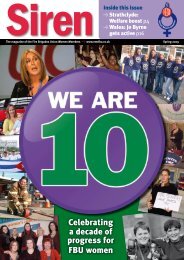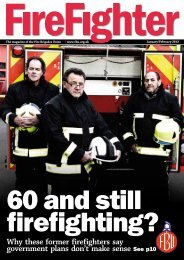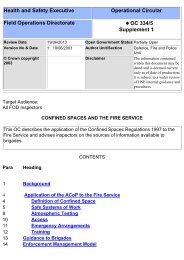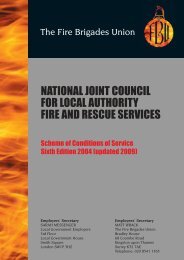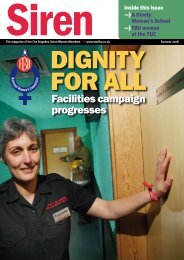Report - Fire Brigades Union
Report - Fire Brigades Union
Report - Fire Brigades Union
Create successful ePaper yourself
Turn your PDF publications into a flip-book with our unique Google optimized e-Paper software.
SECTION B — FIRE AND RESCUE SERVICE POLICY<br />
the Localism Bill, as well as underpinning the opportunity<br />
for firefighters to set up their own mutuals, will enable new<br />
FRAs to develop as the local community wishes.<br />
A Road-Map for the Future<br />
In taking these proposals forward, we would expect the<br />
Government to set a permissive regime in train. In<br />
essence, we would see change being driven through the<br />
desire by local communities for greater control over their<br />
fire and rescue services, and by the ability of individuals to<br />
form their own mutuals to provide that service.<br />
As a consequence to underpin the process, we would<br />
expect the Government to allow individuals districts and<br />
boroughs to become fire and rescue authorities in their<br />
own right, and for firefighters to have the right to set up<br />
their own mutuals. Therefore those FRAs and constituent<br />
bodies who feel that the current system works for them,<br />
can remain with it, while those who are more enterprising<br />
can break away, and become pacesetters for the rest.<br />
However, we do believe that there should be a<br />
requirement in the national framework for FRAs to consult<br />
their staff on the possibility of forming mutuals, and to also<br />
consider the scope for separately commissioning all or part<br />
of the services they receive. The mutualisation process will<br />
need to be underpinned by appropriate detailed advice and<br />
support.<br />
RECOMMENDATIONS<br />
National Framework<br />
A second stage of work is undertaken by the Department<br />
and National Interest Workstream together with<br />
contributors to the <strong>Fire</strong> Futures National Framework<br />
review. This will build upon the work to date and will<br />
develop further the extent and content of the next National<br />
Framework and will encompass the expectation set out<br />
above. This recommendation ties in with other<br />
recommendations set out in the rest of the report<br />
Decentralisation<br />
That the Localism Bill allows districts and boroughs to form<br />
their own FRAs subject to whatever safeguards the<br />
Secretary of State wishes to put in place. That further work<br />
is undertaken by the Department, and National Interest<br />
Workstream together with contributors to the <strong>Fire</strong> Futures<br />
Decentralisation Review in consultation with the wider<br />
sector to address the practical implications of<br />
decentralisation and the support needed to achieve the<br />
goal. DCLG may wish to consider putting pilots in place<br />
with willing district or borough councils. It will be important<br />
to ensure that the appropriate funding architecture is put in<br />
place to support this. This project should be DCLG led.<br />
Mutualisation<br />
DCLG should liaise closely with the Cabinet Office<br />
regarding the setting up of mutuals in the service, with a<br />
view to ensuring the necessary support, guidance and<br />
safeguards are in place. This process should commence as<br />
soon as possible and have regard to the suggested<br />
transition arrangements set out in the report. Where<br />
firefighters wish to form their own mutual, this should have<br />
precedence over any other form of service delivery. The<br />
preparation of comprehensive advice, and provision of the<br />
necessary support will be essential. It would be vital to<br />
consider the full impact of any legal issues.<br />
Commissioning and Delivery<br />
It should be a National Framework requirement that each<br />
FRA should consider commissioning fire and rescue<br />
services within the financial year 2011/12, and engage with<br />
their workforce on the possibility of them setting up<br />
mutuals, either collectively, or in parts of the service.<br />
Where there are proposed station closures, communities<br />
should be allowed to consider the setting up of mutuals to<br />
retain the service if they wish.<br />
Assurance<br />
Assessment and assurance should be built upon sector led<br />
initiatives, with the Chief <strong>Fire</strong> and Rescue Adviser<br />
maintaining an independent overview role. Consideration<br />
should be given to setting up citizen based assessment<br />
systems not unlike HealthWatch. The industry could place<br />
a role in such ‘watch-dog’ organisations. The Chief <strong>Fire</strong> and<br />
Rescue Adviser could be asked to oversee the putting in<br />
place of appropriate assurance arrangements.<br />
3. SECURE PLACE TO LIVE AND WORK: THE BUILT<br />
ENVIRONMENT<br />
The built environment is the area where most fire and<br />
rescue service activity is undertaken. A greater knowledge of<br />
that environment is needed, along with closer working with<br />
the wider fire sector. The built environment continues to<br />
become more complex and the threat of fire more difficult to<br />
counter. We have found that there is significant evidence<br />
that fire safety is currently lagging behind these changes and<br />
needs to catch up, otherwise there is a major risk that fire<br />
safety problems are simply inadvertently created and locked<br />
up in the built environment to cause problems for fire safety<br />
in the future. A national overview is essential, translated to<br />
the local level substantially through the effective process of<br />
Integrated Risk Management Planning.<br />
The regulatory framework is seen as substantially fit for<br />
purpose. The key issue, however, is securing compliance<br />
with the regulations and guidance. That is one of the<br />
biggest concerns of the sector. It is also evident that there<br />
is a significant lack of respect for the regulations, outside<br />
the core fire safety sector, which is also substantially<br />
responsible for a failure to follow compliance.<br />
There is currently a perceived low level of competency<br />
within the sector in relation to fire safety and built<br />
environment, not helped by the fact there is no common<br />
qualifications’ framework that covers building and fire<br />
safety competencies. Whilst the FRS undertakes building<br />
safety checks, no single organisation can take on<br />
responsibility for awareness of fire safety amongst building<br />
designers, constructors, owners and occupiers. This<br />
campaign can be taken on by that part of <strong>Fire</strong> UK, normally<br />
referred to as the ‘industry’. That part of the sector needs<br />
to come together more closely and be less introspective,<br />
58 FBU Annual <strong>Report</strong> 2011





